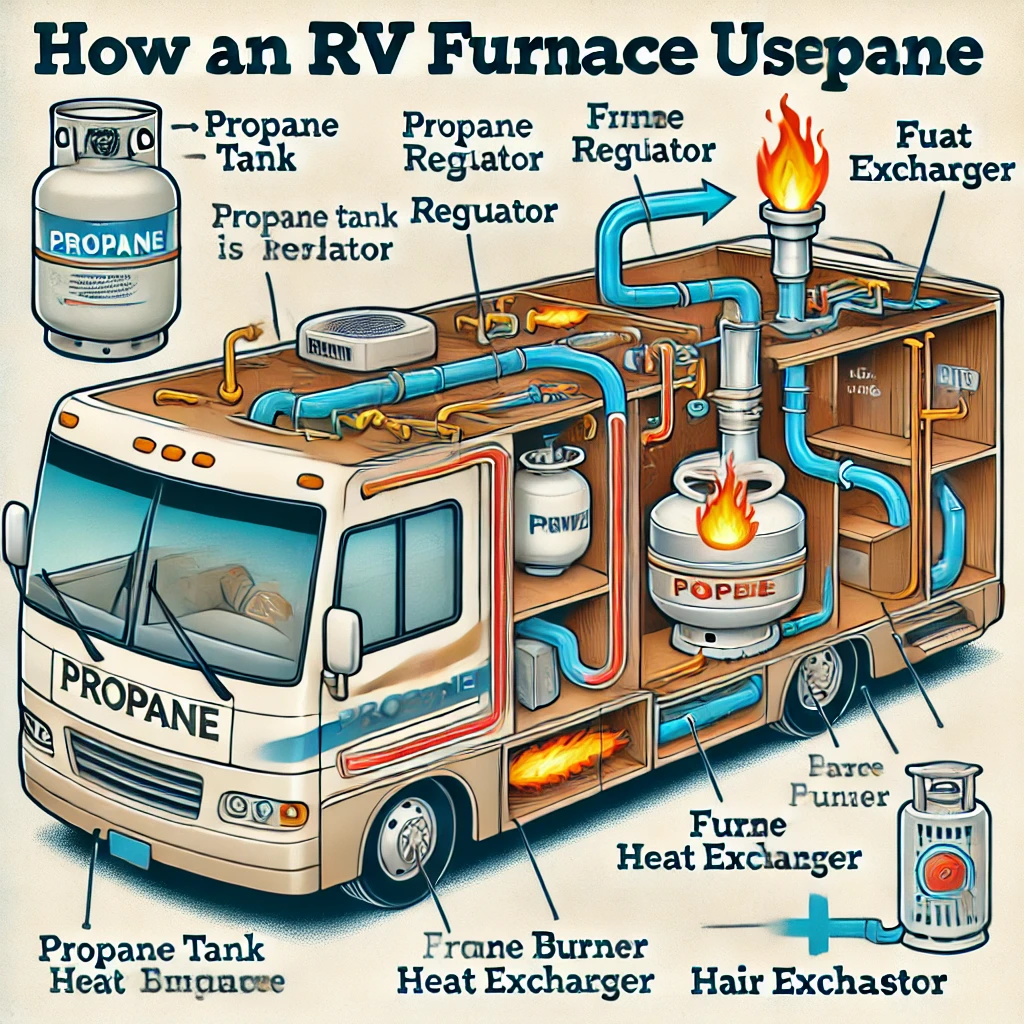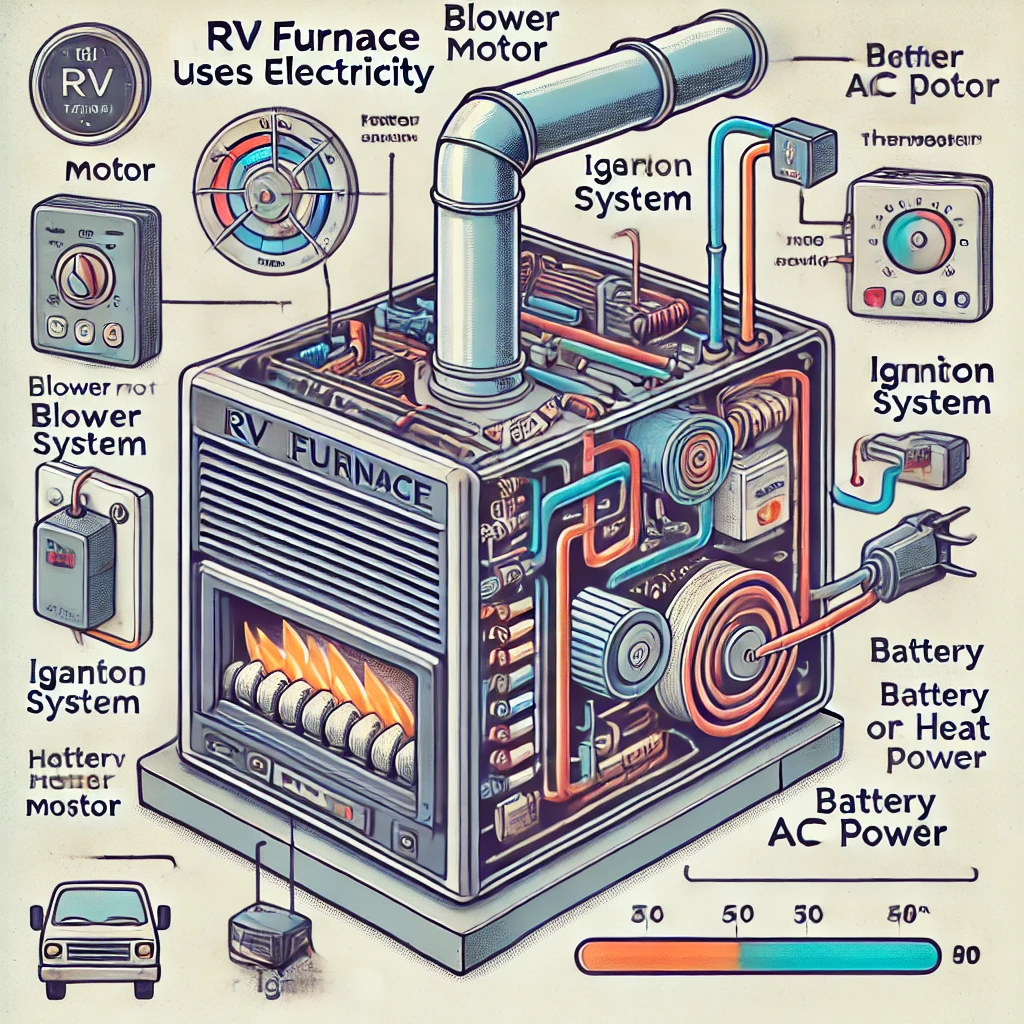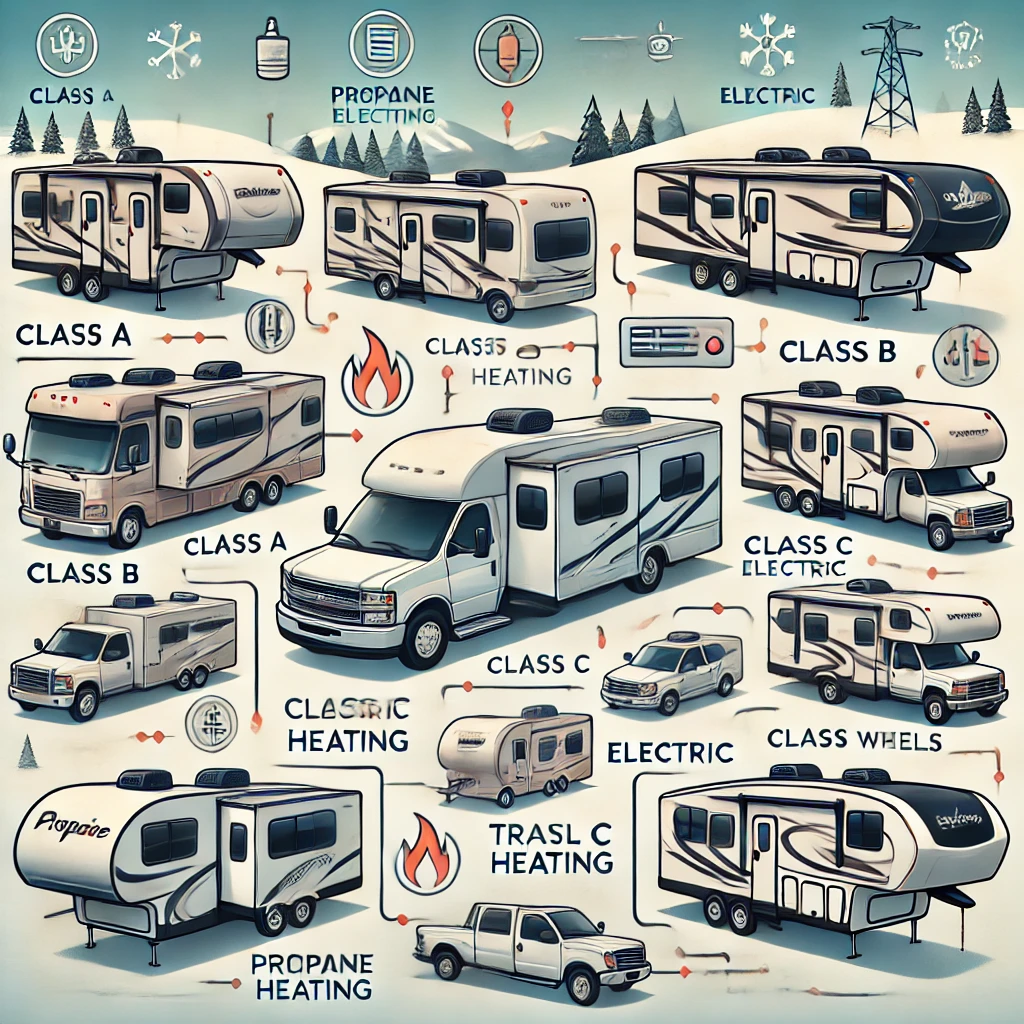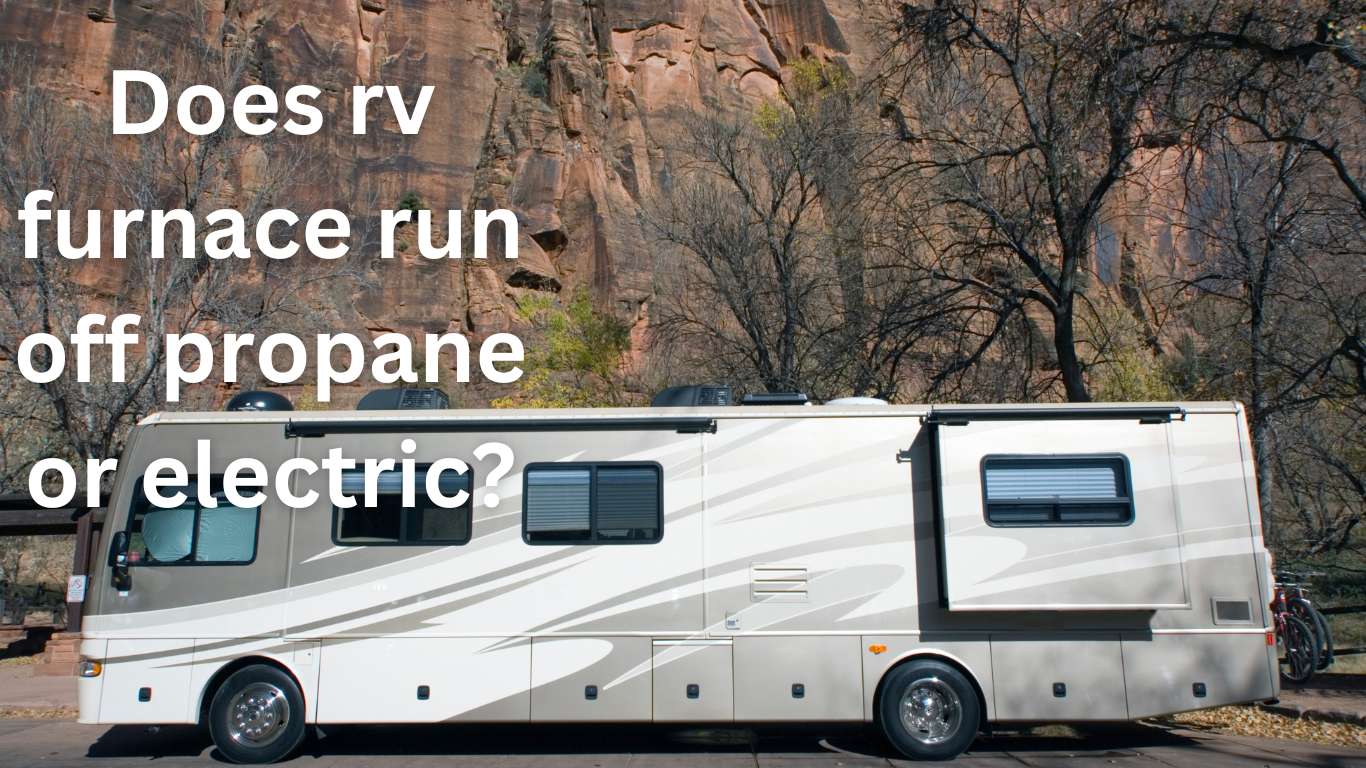When it comes to RV heating, a common question is: Does an RV furnace run off propane or electric? The answer is both straightforward and nuanced. Most RV furnaces primarily run on propane, but they also require electricity to operate certain components. Let’s explore how this works. Does an RV furnace run off propane or electric? Learn how RV furnaces use propane for heat and electricity for operation, and discover the best heating options for your camping needs.
How Does an RV Furnace Use Propane?
Propane as the Primary Heat Source
Propane powers the burner in your RV furnace, producing the heat necessary to keep your camper cozy. This makes it an efficient and portable option, especially for off-grid camping.
Benefits of Using Propane
- High Heating Efficiency: Propane provides consistent warmth, even in freezing conditions.
- Off-Grid Friendly: No need for shore power or a generator to generate heat.

How Does an RV Furnace Use Electricity?
Electricity for Components
While propane heats your RV, electricity is required to:
- Power the blower fan, which circulates warm air throughout your RV.
- Operate the thermostat to control the temperature.
Key Points to Consider
- Battery Dependency: If you’re boondocking, ensure your RV’s battery is charged to run the blower fan.
- Hybrid Models: Some RVs come with electric-only space heaters or heat pumps for milder conditions.

Propane vs. Electric Heating: What’s Right for You?
Advantages of Propane Heating
- Ideal for cold-weather camping or remote areas.
- Runs even without full electrical hookups.
When to Use Electric Heating
- Perfect for campgrounds with shore power.
- Cost-effective since it doesn’t deplete your propane supply.
Tips to Maximize RV Furnace Efficiency
- Maintain Propane Levels: Always check your propane tank before trips.
- Insulate Your RV: Seal windows and doors to reduce heat loss.
- Monitor Battery Life: Keep your RV battery charged to ensure uninterrupted furnace operation.
Which is More Stable and Long-Lasting: Propane or Electric RV Heating?
When comparing propane and electric RV heating, many RV enthusiasts wonder which option is more stable and long-lasting. Both have their strengths, but the answer depends on your camping needs, power availability, and maintenance practices. Let’s break it down.
Propane Heating: Stability and Longevity
Why Propane is Stable
Propane heating is highly reliable, especially for off-grid camping. Since it doesn’t depend on an external power source, it’s perfect for remote locations where electricity isn’t readily available.
Long-Lasting Features of Propane
- Efficiency in Cold Weather: Propane heaters perform consistently, even in freezing temperatures.
- Fuel Availability: Propane tanks are easy to refill or replace, making it convenient for extended trips.
- Durable Components: Propane furnaces are built for rugged use, requiring minimal maintenance if used properly.
Potential Limitations
- Propane is consumed relatively quickly in extreme cold.
- Regular checks for leaks or tank corrosion are necessary for safety.
Electric Heating: Stability and Durability
Why Electric Heating is Reliable
Electric heating systems offer consistent performance, provided you have access to a steady power supply, such as shore power at a campground. They are also less prone to mechanical issues compared to propane systems.
Long-Lasting Benefits of Electric Heating
- Lower Maintenance: Fewer moving parts mean less wear and tear over time.
- Eco-Friendly: No emissions during operation.
- Steady Operation: No need to monitor fuel levels during use.
Considerations for Electric Heating
- Limited by the availability of power hookups or generator capacity.
- Can be less effective in extremely cold conditions compared to propane.
Which Heating System Lasts Longer?
Both propane and electric systems can last for years with proper care. However:
- Propane Systems: Require regular cleaning, vent checks, and tank maintenance for optimal longevity.
- Electric Systems: Depend on electrical reliability but need minimal servicing for components.
Final Verdict: Stability and Longevity
- Choose Propane if you value off-grid stability and high performance in cold weather.
- Opt for Electric if you have access to consistent power and prefer low-maintenance operation.
The Importance of Propane and Electric Heating in Different Classes of RVs
The type of heating system—propane or electric—plays a significant role in ensuring comfort and functionality across various classes of RVs. Each RV class has distinct needs based on size, power availability, and intended use. Here’s how propane and electric heating fit into the picture for different RV types.
Class A Motorhomes: Luxury and Convenience
Why Heating Matters in Class A RVs
Class A motorhomes are the epitome of luxury, often equipped with advanced heating systems. The choice between propane and electric heating depends on travel preferences.
Propane Heating in Class A RVs
- Backup for Cold Weather: Essential for off-grid camping or in areas with freezing temperatures.
- Even Heat Distribution: Built-in systems often use propane for consistent warmth throughout the RV.
Electric Heating in Class A RVs
- Primary Option for Campgrounds: Since Class A RVs frequently stay at full-hookup sites, electric heating is cost-effective.
- Supplementary Heating: Electric fireplaces or heat pumps add a cozy ambiance and extra warmth.
Class B Camper Vans: Compact and Versatile
Heating Needs for Class B RVs
These smaller, more mobile RVs benefit from lightweight and efficient heating solutions.
Propane Heating in Class B RVs
- Efficient for Boondocking: Ideal for remote camping, where propane supplies the heat without draining batteries.
- Space-Saving Design: Compact propane furnaces fit seamlessly into smaller layouts.
Electric Heating in Class B RVs
- Convenient for Urban Stays: Access to shore power in city campgrounds makes electric heating a practical choice.
- Energy-Efficient Options: Smaller spaces mean electric heaters or heat mats work efficiently.
Class C Motorhomes: Balanced Utility
Heating Solutions for Class C RVs
Class C RVs are a hybrid of comfort and practicality, requiring heating systems that cater to both off-grid and campground use.
Propane Heating in Class C RVs
- Dependable for Family Trips: Propane ensures everyone stays warm during long road trips or outdoor adventures.
- Cost-Effective: Propane is often more affordable for frequent travel.
Electric Heating in Class C RVs
- Great for Campground Stays: Perfect for travelers who park in areas with electrical hookups.
- Supplementary Comfort: Electric blankets or space heaters can provide added warmth without using propane.
Travel Trailers and Fifth Wheels: Flexibility in Heating
Importance of Heating in Towable RVs
Heating systems in travel trailers and fifth wheels must accommodate a wide range of camping scenarios.
Propane Heating in Towables
- Ideal for Off-Grid Adventures: Propane furnaces are a must for boondockers or remote camping.
- Reliable for Large Spaces: Fifth wheels often use propane for centralized heating in their spacious interiors.
Electric Heating in Towables
- Cost-Effective for Hookups: Fifth wheels and travel trailers at campgrounds can benefit from electric space heaters or built-in systems.
- Eco-Friendly Option: Reduces reliance on propane when electric power is available.

Should You Choose Propane or Electric Heating for Your RV?
When deciding between propane or electric heating for your RV, the best choice depends on your camping style, travel frequency, and budget. Each heating method has its strengths, and understanding their applications will help you choose the right one.
Why Choose Propane Heating for Your RV?
Key Advantages of Propane Heating
- Perfect for Off-Grid Adventures: Propane is ideal for boondocking or remote camping, where access to electricity is limited.
- Reliable in Cold Weather: Propane systems perform exceptionally well in freezing temperatures, providing consistent warmth.
- Cost-Effective for Frequent Travelers: Propane is widely available and affordable, making it a practical choice for long trips.
Best RV Classes for Propane Heating
- Class B Camper Vans: Compact propane systems ensure warmth without relying heavily on battery power.
- Class C Motorhomes: Propane systems provide dependable heat for family trips.
- Travel Trailers and Fifth Wheels: Large spaces benefit from propane’s powerful and efficient heating capabilities.
Why Choose Electric Heating for Your RV?
Key Advantages of Electric Heating
- Ideal for Hookups: Electric heating is cost-effective and efficient at campgrounds with shore power.
- Low Maintenance: Electric systems require minimal upkeep compared to propane systems.
- Eco-Friendly Option: Electric heating reduces emissions and dependence on fossil fuels.
Best RV Classes for Electric Heating
- Class A Motorhomes: Luxury models often include built-in electric fireplaces and heat pumps for added convenience.
- Towable RVs: Travel trailers and fifth wheels can use portable electric heaters for supplementary warmth.
Factors to Consider Before Choosing
- Your Camping Style:
- For remote locations, propane is the better choice.
- For campgrounds with electrical hookups, go for electric heating.
- Climate:
- In extreme cold, propane provides consistent heat.
- For mild climates, electric heating is more than sufficient.
- Budget:
- Frequent travelers may find propane more economical over time.
- Campers using shore power can save by opting for electric heating.
Final Recommendation
- Choose Propane: If you enjoy boondocking, need reliable heat in cold weather, or frequently travel off-grid.
- Choose Electric: If you mostly stay at campgrounds with hookups and prefer an eco-friendly, low-maintenance option.
More related details will be available on Flamingo Motorhomes.

